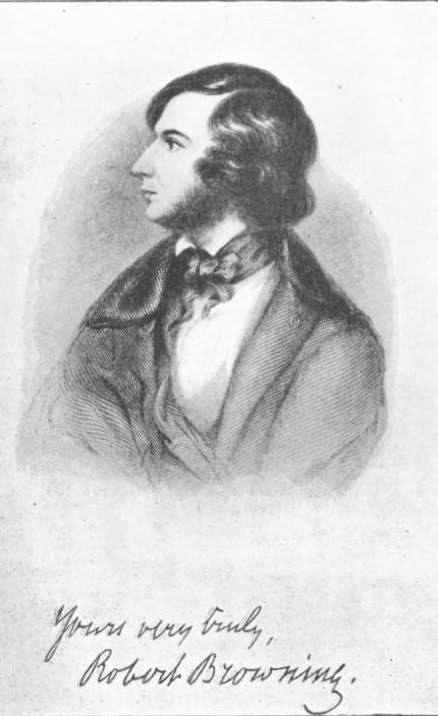Robert Browning

Born in Camberwell, a London suburb. His father is a clerk at the Bank of England; his family are religious dissenters.
Takes up school, as a weekly boarder in Peckham.
Begins writing poetry, influenced largely by Shelley. Is tutored in French, Italian, Latin, and Greek.
Attends London University for a semester; there he toys with atheism. Returns home, to study, write, and publish (at his father's expense) poetry. He will live at home until his thirties.
Anonymously publishes his first work, the autobiographical Pauline, A Fragment of a Confession. It has almost no sales. Starts work on Sordello.
Travels across Europe to Saint Petersburg, Russia; returns home.
Publishes Paracelsus, which wins literary praise. Begins friendships with Carlyle, poet and critic W. S. Landor, and other men of letters.
Strafford, the first of a series of unsuccessful plays, is produced and published.
First visit to Italy.
Publishes Sordello, a long narrative poem in dramatic monologue. It gains a reputation as "unintelligible" and "meaningless," establishing Browning as an obscure poet.
Begins publishing a series of books under the title Bells and Pomegranates; composed mostly of plays. Publishes Pippa Passes.
Publishes collection of poems called Dramatic Lyrics, including notably "My Last Duchess."
Production of three now-obscure plays. Visits Italy for a second time.
Writes a letter to Elizabeth Barrett praising her poetry. Visits her and declares his love. Her father is against marriage, though.
Publication of Dramatic Romances and Lyrics.
Publication of A Soul's Tragedy, concluding the Bells and Pomegranates series. Marries Elizabeth Barrett, secretly. They settle in Florence, Italy, where they will live in a happy marriage for fifteen years.
A son is born, Robert Barrett-Browning ("Pen").
Publishes Christmas Eve and Easter Day.
Visits Paris and London. Strikes friendships with literary and artistic figures of the day, including Dante Gabriel Rossetti, Charles Kingsley, and Tennyson.
Publishes a two-volume poetry collection, Men and Women, which includes most of his best works, including "Fra Lippo Lippi" and "Andrea del Sarto."
Elizabeth Barrett Browning dies; Browning moves to London with his son "Pen."
Publishes Dramatis Personae.
Publishes The Ring and the Book, a long narrative poem of greed, deception, and murder; based on an Italian story. Though it was a popular success, it is now little read.
Proposes marriage to Lady Ashburton, only to be rejected. This proposal, an example of RB's propensity for social climbing, will continue to embarrass him in society and shame him over his infidelity toward his dead wife.
Publishes over a dozen volumes of poetry during this period. They include narrative poems such as "Red-Cotton Nightcap Country" and the two collections of Dramatic Idylls, verse plays such as The Inn Album, and translations from Greek such as The Agamemnon of Aeschylus.
Dr. F. J. Furnivall and others establish the Browning Society in London. They study his works and idolize him.
Publishes Asolando, a last collection of poems, and an edition of his complete works.
Dies in Venice of bronchitis; is buried in Poets' Comer of Westminster Abbey.
Infinite passion, and the pain
Of finite hearts that yearn.